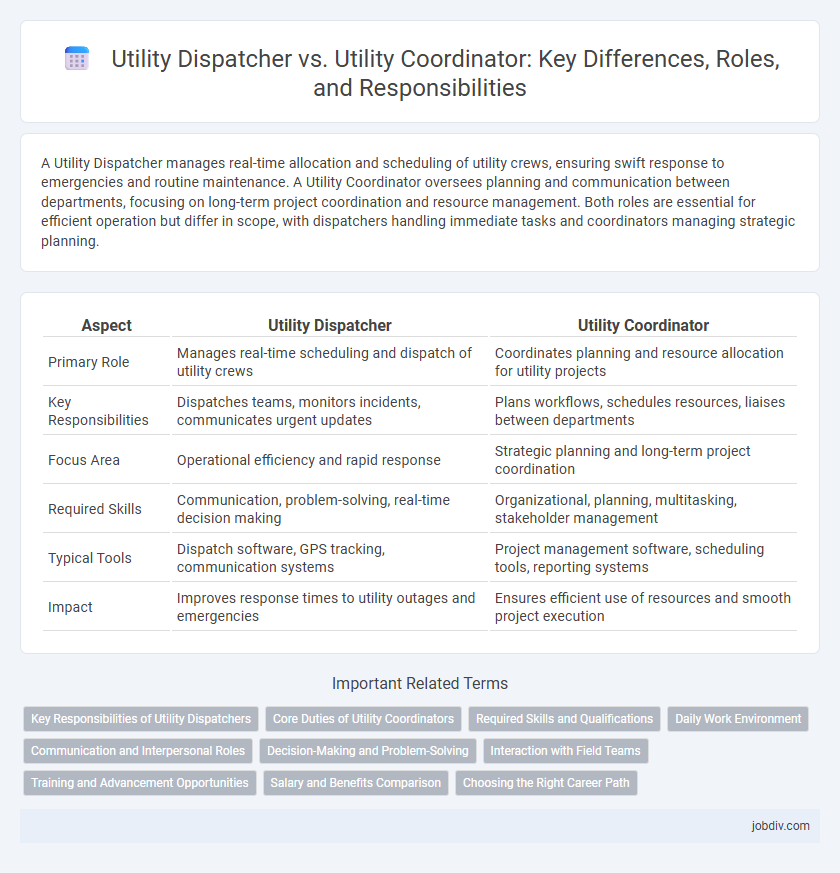A Utility Dispatcher manages real-time allocation and scheduling of utility crews, ensuring swift response to emergencies and routine maintenance. A Utility Coordinator oversees planning and communication between departments, focusing on long-term project coordination and resource management. Both roles are essential for efficient operation but differ in scope, with dispatchers handling immediate tasks and coordinators managing strategic planning.
Table of Comparison
| Aspect | Utility Dispatcher | Utility Coordinator |
|---|---|---|
| Primary Role | Manages real-time scheduling and dispatch of utility crews | Coordinates planning and resource allocation for utility projects |
| Key Responsibilities | Dispatches teams, monitors incidents, communicates urgent updates | Plans workflows, schedules resources, liaises between departments |
| Focus Area | Operational efficiency and rapid response | Strategic planning and long-term project coordination |
| Required Skills | Communication, problem-solving, real-time decision making | Organizational, planning, multitasking, stakeholder management |
| Typical Tools | Dispatch software, GPS tracking, communication systems | Project management software, scheduling tools, reporting systems |
| Impact | Improves response times to utility outages and emergencies | Ensures efficient use of resources and smooth project execution |
Key Responsibilities of Utility Dispatchers
Utility dispatchers manage real-time operations by monitoring utility networks, coordinating service crews, and responding swiftly to outages or emergencies. They ensure efficient allocation of resources by relaying accurate information between field personnel and control centers to maintain system stability. Their role is critical in minimizing downtime and ensuring continuous delivery of essential services like electricity, gas, or water.
Core Duties of Utility Coordinators
Utility Coordinators manage the scheduling and communication among multiple utility service providers to ensure seamless project execution and avoid conflicts. They review project plans to identify utility locations, coordinate permits, and monitor construction activities to ensure compliance with safety regulations. Unlike Utility Dispatchers, who primarily handle field crew assignments and real-time dispatch operations, Utility Coordinators focus on long-term planning, inter-agency liaison, and risk mitigation through proactive utility coordination.
Required Skills and Qualifications
Utility Dispatchers require strong communication skills, proficiency in computer-aided dispatch (CAD) systems, and the ability to monitor and coordinate emergency service responses effectively. Utility Coordinators need advanced project management skills, in-depth knowledge of regulatory compliance, and expertise in resource allocation to ensure seamless operation of utility infrastructure. Both roles demand high-level problem-solving abilities and familiarity with utility industry standards.
Daily Work Environment
Utility Dispatchers manage real-time communication and coordination of field crews, monitoring system status through advanced software to respond swiftly to outages or emergencies. Utility Coordinators oversee scheduling, resource allocation, and compliance tracking, ensuring smooth operational workflows and regulatory adherence within utility companies. Both roles operate in fast-paced environments demanding strong problem-solving skills, but Dispatchers emphasize immediate issue resolution while Coordinators focus on strategic planning and administrative support.
Communication and Interpersonal Roles
Utility Dispatchers manage real-time communication between field technicians and control centers, ensuring precise and timely information flow to address service interruptions. Utility Coordinators oversee broader communication strategies and stakeholder interactions, facilitating collaboration between multiple departments and external agencies. Both roles require strong interpersonal skills to maintain clarity, resolve conflicts, and support effective teamwork in high-pressure utility environments.
Decision-Making and Problem-Solving
Utility Dispatchers make real-time decisions to manage and allocate resources efficiently during emergencies, focusing on immediate problem-solving to restore services quickly. Utility Coordinators oversee broader operational planning and coordination, resolving complex issues by analyzing data trends and prioritizing long-term infrastructure reliability. Both roles require critical decision-making skills, but Dispatchers prioritize urgent response actions while Coordinators focus on strategic problem resolution.
Interaction with Field Teams
Utility Dispatchers manage real-time communication with field teams, efficiently assigning tasks and responding to emergencies to ensure continuous service. Utility Coordinators oversee broader operational planning, coordinating multiple dispatchers and field crews to optimize resource allocation and project timelines. Their interaction is crucial for seamless information flow, enabling swift decision-making and effective field team deployment.
Training and Advancement Opportunities
Utility Dispatchers often receive specialized training in real-time resource allocation, emergency response coordination, and advanced communication systems, enhancing their ability to manage critical situations efficiently. Utility Coordinators typically undergo broader training that includes project management, regulatory compliance, and strategic planning, preparing them for leadership roles and higher levels of responsibility within utility operations. Career advancement for Utility Dispatchers may lead to roles in supervisory dispatch or technical support, while Utility Coordinators often progress into management positions or specialized fields such as regulatory affairs and utility infrastructure development.
Salary and Benefits Comparison
Utility Dispatchers typically earn an average salary ranging from $45,000 to $60,000 annually, with benefits often including health insurance, retirement plans, and paid time off. Utility Coordinators generally command higher salaries, averaging between $55,000 and $75,000 per year, reflecting their expanded responsibilities and project management roles, accompanied by enhanced benefits such as performance bonuses and professional development opportunities. Salary variations depend on factors like geographic location, company size, and years of experience within the utility sector.
Choosing the Right Career Path
Utility dispatchers manage real-time operations by monitoring system performance and directing field crews to address outages or maintenance, ensuring continuous service reliability. Utility coordinators oversee project planning, resource allocation, and compliance with regulatory standards, playing a strategic role in optimizing utility infrastructure and workflows. Selecting the right career path depends on whether one prefers hands-on operational control in fast-paced environments or strategic planning and coordination within utility services.
Utility Dispatcher vs Utility Coordinator Infographic

 jobdiv.com
jobdiv.com